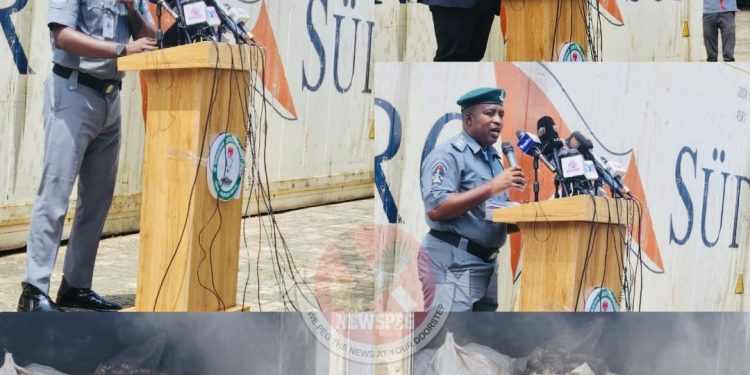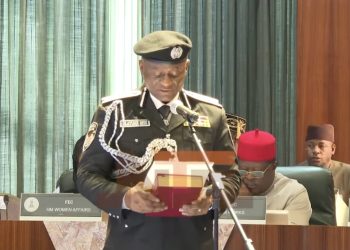…officially hands over intercepted items to the National Environmental Standards and Regulations Enforcement Agency
By Nkechi Eze
For decades, Nigeria has served as both a transit and origin point for the illegal trade in wildlife products, a multibillion-dollar global enterprise that threatens biodiversity, fuels organized crime, and undermines national security. With its vast forests, wetlands, and savannahs teeming with diverse species, Nigeria has found itself increasingly targeted by transnational wildlife traffickers seeking to exploit porous borders and limited enforcement capacity. Yet, in recent years, the Nigerian government, through the Nigeria Customs Service (NCS), has stepped up its counter-trafficking efforts, drawing both national and international attention to its growing resolve in the fight against illegal wildlife trade. Nkechi Eze for Newspeg Magazine and online writes.
In a bold reaffirmation of this commitment, the Nigeria Customs Service announced the seizure of a 40-foot container loaded with prohibited wildlife products, specifically donkey genitals, along the Kaduna-Abuja Expressway. The operation which took place on Friday, 5th July 2025, at about 9:00 p.m., was made possible through credible intelligence and the coordinated efforts of officers from the Customs Intelligence Unit under the Special Wildlife Office (SWO).
The intercepted items were officially handed over today, to the National Environmental Standards and Regulations Enforcement Agency (NESREA) at the NCS Government Warehouse in Karu, Abuja.
Addressing journalists at the event on behalf of the Comptroller-General of Customs, Bashir Adeniyi, who was unavoidably absent, the National Public Relations Officer of the NCS, Assistant Comptroller Abdullahi Maiwada, said
“This seizure is not just another operation, it is part of our national mandate to dismantle trafficking networks and protect endangered species in line with Nigeria’s obligations under the Convention on International Trade in Endangered Species of Wild Fauna and Flora (CITES).”
Maiwada thanked the media and wildlife protection stakeholders for their support, adding;
“We are here today because we understand that protecting the environment is a collective responsibility, and we remain committed to interagency collaboration and global accountability in this fight.”
The Special Wildlife Office, established within the Customs Intelligence Unit, has been instrumental in scaling up enforcement through intelligence gathering, profiling, investigation, and coordinated cross-border operations. These efforts are undertaken in partnership with national and international organizations such as the Wildlife Conservation Society (WCS), Focused Conservation, the Wildlife Justice Commission (WJC), and enforcement bodies like NDLEA, EFCC, the Nigeria Police, INTERPOL, and the Office of the National Security Adviser.
“The WCS has been a particularly valuable partner,” Maiwada said, “providing secure warehouses for intercepted specimens and supporting intelligence-led operations across the country.”
While Friday’s seizure is particularly alarming, AC Maiwada emphasized that it is not an isolated incident. Within the last 12 months, the Special Wildlife Office has carried out several high-profile interceptions.
Among these was the interception of six African grey parrots and the arrest of a suspect in Kano on 10th December 2024; the recovery of two live pangolins, five mona monkeys, two tantalus monkeys, a baby baboon, and another African grey parrot at Lagos Airport in May 2025; and the arrest of a suspect in the Ekong area of Cross River State in connection with 213 parrot heads, six eagle heads, 128 hornbill heads, and other exotic remains in January 2025.
In another operation, 119.4 kilograms of pangolin scales concealed in sacks were seized in Calabar, Cross River State. A further interception led to the rescue of 120 African grey parrots and the arrest of a suspect in Fufore, Adamawa State. Other seizures included tortoises, lion and zebra parts, gorilla remains, and additional illicit wildlife cargo smuggled through ports and logistic routes.
“The scale and sophistication of these operations speak volumes,” said Maiwada.
“Wildlife trafficking is no longer a fringe issue, it’s now deeply entangled with organized crime, including money laundering and currency smuggling.”
AC Maiwada further disclosed that under the leadership of the Comptroller-General and his management team, the NCS is investing heavily in digital surveillance, cross-border enforcement coordination, and species identification training. According to him, investigations increasingly rely on digital forensics and phone analysis to gather evidence, with multiple prosecutions now underway.
In his remarks and vote of thanks, Assistant Comptroller of Customs Anuhu Samaila Mani, Officer-in-Charge of the Special Wildlife Office, further underscored the Service’s determination.
“Since inception, our mission has been clear: to protect Nigeria’s rich biodiversity and uphold our obligations under international conservation agreements,” Mani said.
He reported that from December 2024 to June 2025, over 220 live endangered animals have been rescued, and more than 6,000 kilograms of pangolin scales and 37 taxidermy specimens were seized.
He revealed that the most recent interception 10,603 donkey genitals, represents an equivalent number of animals slaughtered.
“This is shocking and tragic. The consignment in the container behind me tells a story of cruelty, greed, and environmental destruction that cannot be ignored,” Mani said.
According to Mani, ten suspects have been arrested, with one conviction already secured and nine other cases currently being prosecuted in court.
He highlighted the Service’s partnerships with both local and international agencies, including the Federal Ministry of Environment, NESREA, the Nigerian Police, INTERPOL, the World Customs Organization, and UNODC, among others.
He also acknowledged the role of NGOs stating “Our partners, including Focused Conservation, Wildlife Conservation Society, Green fingers, and the Pangolin Conservation Trust, have helped with intelligence sharing, training, and public awareness campaigns.”
To build on these gains, Mani disclosed that the SWO is strengthening operations with modern surveillance tools, expanding forensic capabilities, and deploying community awareness programs in rural and border communities.
“Many of these species are not even native to Nigeria. They are in transit. That’s why engaging border communities is so critical. We’ve gone to the grassroots to educate people about the environmental and legal consequences of this illicit trade,” he explained.
Looking ahead, he emphasized that the Service would continue to expand its reach, bolster legal frameworks, and deepen international collaboration.
ACC Mani ended his remarks with a passionate appeal; “While we celebrate successes, we acknowledge that much work remains. The threat of wildlife crime continues to evolve. If we do not sustain our environment, our environment will not sustain us.”
As Nigeria continues to cement its role in regional and global anti-trafficking efforts, the Nigeria Customs Service vows to remain steadfast, blending intelligence, enforcement, and advocacy to protect the nation’s natural heritage for generations to come.

















